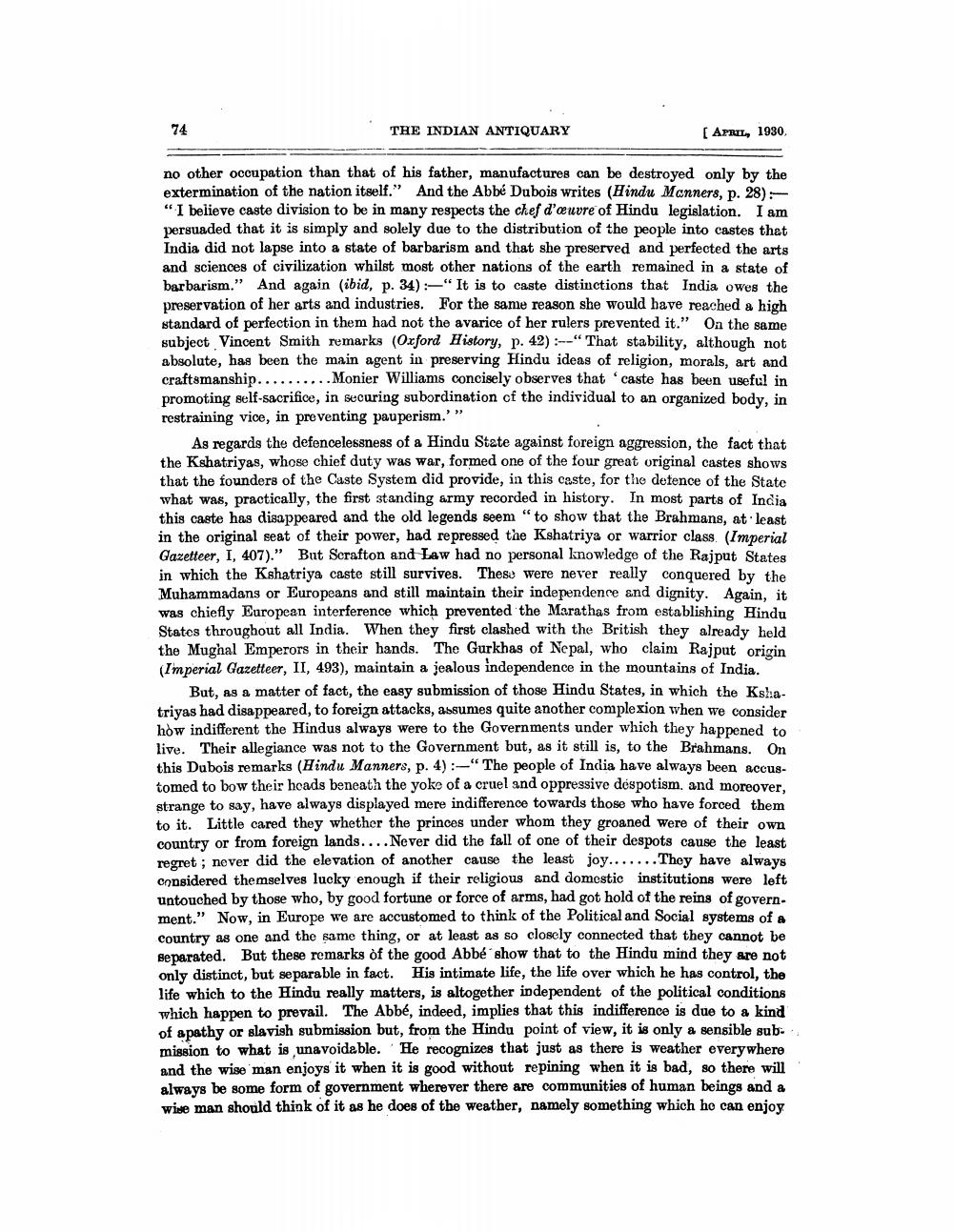________________
74
THE INDIAN ANTIQUARY
APRIL, 1930
no other occupation than that of his father, manufactures can be destroyed only by the extermination of the nation itself." And the Abbé Dubois writes (Hindu Manners, p. 28) “I believe caste division to be in many respects the chef d'ouvre of Hindu legislation. I am persuaded that it is simply and solely due to the distribution of the people into castes that India did not lapse into a state of barbarism and that she preserved and perfected the arts and sciences of civilization whilst most other nations of the earth remained in a state of barbarism." And again (ibid, p. 34) -" It is to caste distinctions that India owes the preservation of her arts and industries. For the same reason she would have reached a high standard of perfection in them had not the avarice of her rulers prevented it.” On the same subject Vincent Smith remarks (Oxford History, p. 42) --" That stability, although not absolute, has been the main agent in preserving Hindu ideas of religion, morals, art and craftsmanship.......... Monier Williams concisely observes that caste has been useful in promoting self-sacrifice, in securing subordination of the individual to an organized body, in restraining vice, in preventing pauperism.'”
As regards the defencelessness of a Hindu State against foreign aggression, the fact that the Kshatriyas, whose chief duty was war, formed one of the four great original castes shows that the founders of the Caste System did provide, in this caste, for the defence of the State what was, practically, the first standing army recorded in history. In most parts of India this caste has disappeared and the old legends seem" to show that the Brahmans, at least in the original seat of their power, had repressed the Kshatriya or warrior class. (Imperial Gazetteer, I, 407)." But Scrafton and Law had no personal knowledge of the Rajput States in which the Kshatriya caste still survives. These were never really conquered by the Muhammadans or Europeans and still maintain their independence and dignity. Again, it was chiefly European interference which prevented the Marathas from establishing Hindu States throughout all India. When they first clashed with the British they already held the Mughal Emperors in their hands. The Gurkhas of Nepal, who claim Rajput origin (Imperial Gazetteer, II, 493), maintain a jealous independence in the mountains of India.
But, as a matter of fact, the easy submission of those Hindu States, in which the Kshatriyas had disappeared, to foreign attacks, assumes quite another complexion when we consider how indifferent the Hindus always were to the Governments under which they happened to live. Their allegiance was not to the Government but, as it still is, to the Brahmans. On this Dubois remarks (Hindu Manners, p. 4) :-"The people of India have always been accustomed to bow their heads beneath the yoke of a cruel and oppressive despotism, and moreover, strange to say, have always displayed mere indifference towards those who have forced them to it. Little cared they whether the princes under whom they groaned were of their own country or from foreign lands....Never did the fall of one of their despots cause the least regret ; never did the elevation of another cause the least joy....... They have always considered themselves lucky enough if their religious and domestic institutions were left untouched by those who, by good fortune or force of arms, had got hold of the reins of govern. ment." Now, in Europe we are accustomed to think of the Political and Social systems of a country as one and the same thing, or at least as so closely connected that they cannot be Beparated. But these remarks of the good Abbé show that to the Hindu mind they are not only distinct, but separable in fact. His intimate life, the life over which he has control, the life which to the Hindu really matters, is altogether independent of the political conditions which happen to prevail. The Abbé, indeed, implies that this indifference is due to a kind of apathy or slavish submission but, from the Hindu point of view, it is only a sensible sub mission to what is unavoidable. He recognizes that just as there is weather everywhere and the wise man enjoys it when it is good without repining when it is bad, so there will always be some form of government wherever there are communities of human beings and a wise man should think of it as he does of the weather, namely something which ho can enjoy




